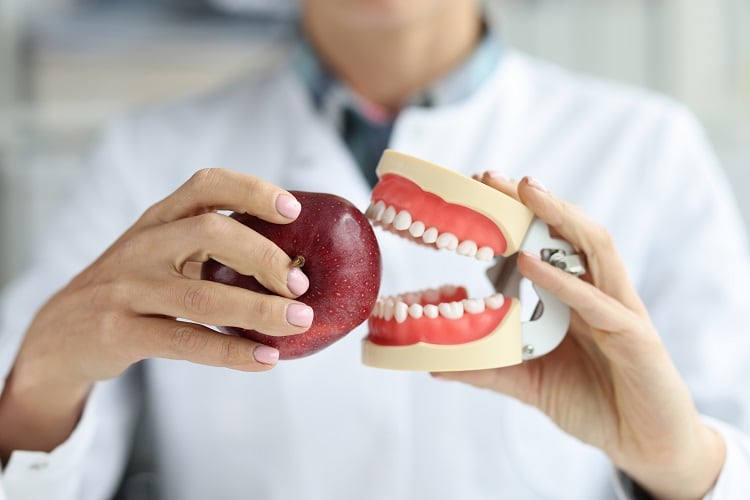The study, written by Yeter E. Bayram and Mehmet A. Eskan and published in the journal PLOS One, shows that poor mastication (chewing), which can be brought about by things such as tooth decay or dentures that don’t fit well, can cause the increase in glucose levels within the blood for T2D patients.
This is because mastication helps these patients to absorb nutrients such as calcium, dietary fibre and magnesium, all of which are known for mitigating the effects of T2D. Poor mastication can even make one more likely to develop T2D.
Poor mastication is also associated with other health problems such as cardiovascular disease, strokes, obesity, and cognitive impairment.
When good mastication occurs, it creates a lower level of post-meal blood glucose by increasing the presence of the anorexigenic gut peptide YY and glucagon-like peptide 1 (GLP-1) in the tissue of the intestine. This can in turn increase early-phase insulin secretion.
As well as damaged teeth, mastication can be affected by sarcopenia, which is the weakening of the muscles. When the masseter muscle (chewing muscle) weakens, it becomes more difficult to chew.
The link between mastication and blood glucose is important. According to the study, an increase of 1% in blood glucose ups the risk of cardiovascular disease and ischemic heart disease mortality in T2D patients by 40%.
While multiple studies had suggested a link between good mastication and lower levels of glucose in T2D patients, the link had not been made clear. So Eskan and Bayram set out to prove this link.
To chew or not to chew
The authors chose 94 subjects, all of whom had been diagnosed with T2D for over a year, at an outpatient clinic in Istanbul, Turkey.
The groups were rated according to the level of areas of contact between the two sets of teeth, also known as the occlusal functional areas. Some patients could chew normally, their teeth making contact with each other well. Others found chewing far more difficult, because of missing or misplaced teeth.
They were split into three groups with three different amounts of occlusal functional areas. The group with the best occlusal function was the control group.
As of 2019, around half a billion people worldwide had diabetes, and of those, 90% of cases were type 2 diabetes.
The tests found that those with naturally good mastication (the control group) had the lowest levels of blood glucose. Of those with diminished occlusal function, those who were given better dentures by the researchers had their levels of blood glucose lowered, meaning that providing support to patients’ mastication had a significant affect on their blood glucose.
“Our findings show there is a strong association between mastication and controlling blood glucose levels among T2D patients,” said Eskan.
The study is the first, according to the researchers, to make the link between good mastication and blood glucose levels clear.
Sourced From: PLOS One
'Mastication inefficiency due to diminished or lack of occlusal support is associated with increased blood glucose levels in patients with type 2 diabetes’
Published on: 14 April 2023
DOI: https://doi.org/10.1371/journal.pone.0284319
Authors: Y. E. Bayram, M. A. Eskan





